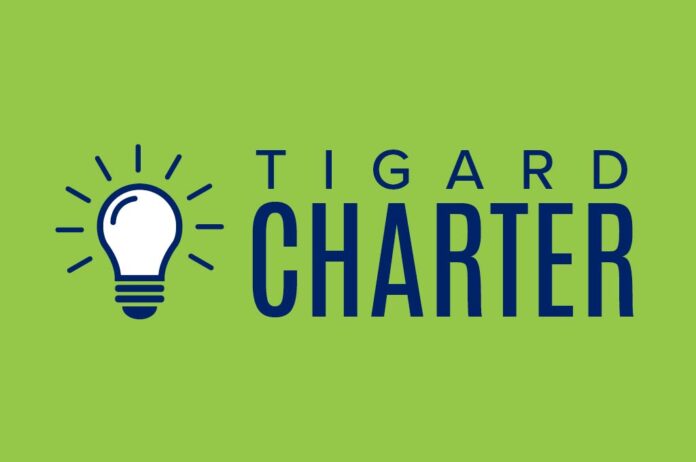Tigard voters have the final say this May on a city charter update that would add City Council seats, alter term limits, drop a clause requiring voter permissions for light rail expansion, and open the Willamette River as a possible future water source for the city.
In a Feb. 12 meeting, the Council referred the revised city charter to the ballot, along with a Public Safety levy renewal ask, which seeks to extend an existing 2020 police funding levy.
The Charter, which lays out the structure, powers, and procedures of Tigard city government, hasn’t been comprehensively updated since it was adopted in 1962.
Proposed changes simplify the document, clarifying language in some sections and eliminating other sections, while leaving intact the core of how Tigard’s government is structured, how laws are passed, and how officials are elected.
Members of the community-led review committee met 15 times over eight months in 2023, combing through the document clause by clause and studying charters from around the state and state and local laws to create the update.
The 14-member group was comprised of community members, city officials, and a youth representative.
They recommended rewriting rather than amending to create clarity and uniformity and address a 60-year trail of previous and sometimes contradictory amendments written in various styles.
“The organization of the charter had also become confusing over time, for example, details about the Mayor’s role in government can be found in three different places,” according to an explanation on the city’s website.
During an October 2023 meeting, the group presented a draft to the Council, which councilors approved moving forward with a ballot referral.
If passed, the new city charter will take effect July 1, allowing voters time to fill two new council seats this fall.
City Council Size and Term Limits
Term limits for elected officials and the size of Council see the biggest changes in the rewrite.
City Council grows by two members under the new document, increasing the body’s membership from five to seven voting members: six Councilors and the Mayor, plus a Youth Councilor appointed to a one-year advisory term.
Most comparable-sized cities have six Councilors, the committee noted in a September report to Council.
Additionally, it cuts the Council President’s term from two years to one to rotate the position through more people and requires candidates to live and be registered to vote in Tigard for at least one year before running.
The document also increases term limits for elected officials – the issue that sparked the review after ambiguous language in the original charter left questions about then-Mayor Jason Snider’s eligibility to run as an incumbent in 2022.
The existing rules cap combined mayoral and council service at 12 consecutive years, with no more than eight consecutive years in either position before a break in service would be needed to restart the clock. But it failed to define consecutive years and didn’t specify how much time out of office.
The update resolves both, allowing 16 consecutive years in office, with a maximum of two terms in the same position. After maxing out, officials can’t run again for two years.
It also specifies that terms under three years, in cases where someone fills a vacated seat to finish out a term, won’t count against the limit.
Public Transit
Gone in the update is a 2014 amendment, added after a voter-approved ballot initiative, that formally opposed light rail expansion into the city without voter approval, clearing obstacles to a long-discussed Southwest Corridor light rail extension.
Tigard voters green-lighted a proposed Southwest Corridor route through Tigard in 2016, effectively nullifying the amendment. The $2.5 billion plan, which never came to fruition, would have begun near Portland State University and run 11 miles west and south to Bridgeport village.
The plan, which called for five Tigard light rail stops, died in 2020 after voters in three counties defeated a $5.2 billion Metro regional transportation measure that included funding for the line.
The update also nixes an imperative for the Mayor to publicly oppose public transit, a rule that was sunsetted in 2022 and was no longer part of the charter during the review process.
The Charter Review Committee unanimously recommended both changes.
Water Rights
Along with the changes to public transit, the new charter also drops a clause that prevented Tigard from using water from the Willamette River, opening the possibility of an additional drinking water source in the future.
If passed, Amendments to the new document can made by ballot initiatives to be voted on during primary or general elections.
To review the existing charter, which will remain in effect if the update fails at the ballot, visit: ecode360.com/TI5024.






















